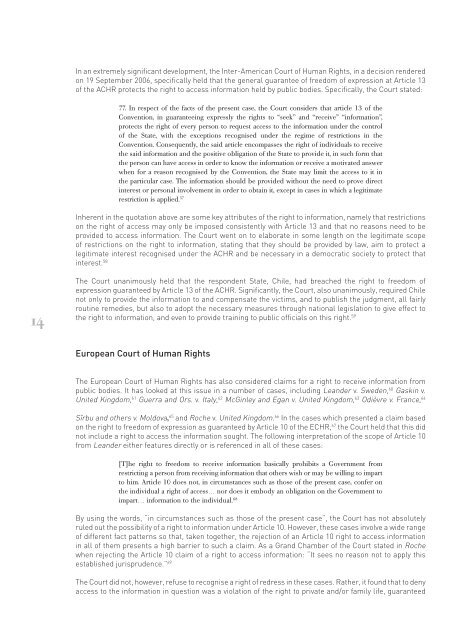Freedom of Information: A Comparative Legal Survey - Federation of ...
Freedom of Information: A Comparative Legal Survey - Federation of ...
Freedom of Information: A Comparative Legal Survey - Federation of ...
You also want an ePaper? Increase the reach of your titles
YUMPU automatically turns print PDFs into web optimized ePapers that Google loves.
14<br />
In an extremely signifi cant development, the Inter-American Court <strong>of</strong> Human Rights, in a decision rendered<br />
on 19 September 2006, specifi cally held that the general guarantee <strong>of</strong> freedom <strong>of</strong> expression at Article 13<br />
<strong>of</strong> the ACHR protects the right to access information held by public bodies. Specifi cally, the Court stated:<br />
77. In respect <strong>of</strong> the facts <strong>of</strong> the present case, the Court considers that article 13 <strong>of</strong> the<br />
Convention, in guaranteeing expressly the rights to “seek” and “receive” “information”,<br />
protects the right <strong>of</strong> every person to request access to the information under the control<br />
<strong>of</strong> the State, with the exceptions recognised under the regime <strong>of</strong> restrictions in the<br />
Convention. Consequently, the said article encompasses the right <strong>of</strong> individuals to receive<br />
the said information and the positive obligation <strong>of</strong> the State to provide it, in such form that<br />
the person can have access in order to know the information or receive a motivated answer<br />
when for a reason recognised by the Convention, the State may limit the access to it in<br />
the particular case. The information should be provided without the need to prove direct<br />
interest or personal involvement in order to obtain it, except in cases in which a legitimate<br />
restriction is applied. 57<br />
Inherent in the quotation above are some key attributes <strong>of</strong> the right to information, namely that restrictions<br />
on the right <strong>of</strong> access may only be imposed consistently with Article 13 and that no reasons need to be<br />
provided to access information. The Court went on to elaborate in some length on the legitimate scope<br />
<strong>of</strong> restrictions on the right to information, stating that they should be provided by law, aim to protect a<br />
legitimate interest recognised under the ACHR and be necessary in a democratic society to protect that<br />
interest. 58<br />
The Court unanimously held that the respondent State, Chile, had breached the right to freedom <strong>of</strong><br />
expression guaranteed by Article 13 <strong>of</strong> the ACHR. Signifi cantly, the Court, also unanimously, required Chile<br />
not only to provide the information to and compensate the victims, and to publish the judgment, all fairly<br />
routine remedies, but also to adopt the necessary measures through national legislation to give effect to<br />
the right to information, and even to provide training to public <strong>of</strong>fi cials on this right. 59<br />
European Court <strong>of</strong> Human Rights<br />
The European Court <strong>of</strong> Human Rights has also considered claims for a right to receive information from<br />
public bodies. It has looked at this issue in a number <strong>of</strong> cases, including Leander v. Sweden, 60 Gaskin v.<br />
United Kingdom, 61 Guerra and Ors. v. Italy, 62 McGinley and Egan v. United Kingdom, 63 Odièvre v. France, 64<br />
Sîrbu and others v. Moldova, 65 and Roche v. United Kingdom. 66 In the cases which presented a claim based<br />
on the right to freedom <strong>of</strong> expression as guaranteed by Article 10 <strong>of</strong> the ECHR, 67 the Court held that this did<br />
not include a right to access the information sought. The following interpretation <strong>of</strong> the scope <strong>of</strong> Article 10<br />
from Leander either features directly or is referenced in all <strong>of</strong> these cases:<br />
[T]he right to freedom to receive information basically prohibits a Government from<br />
restricting a person from receiving information that others wish or may be willing to impart<br />
to him. Article 10 does not, in circumstances such as those <strong>of</strong> the present case, confer on<br />
the individual a right <strong>of</strong> access… nor does it embody an obligation on the Government to<br />
impart… information to the individual. 68<br />
By using the words, “in circumstances such as those <strong>of</strong> the present case”, the Court has not absolutely<br />
ruled out the possibility <strong>of</strong> a right to information under Article 10. However, these cases involve a wide range<br />
<strong>of</strong> different fact patterns so that, taken together, the rejection <strong>of</strong> an Article 10 right to access information<br />
in all <strong>of</strong> them presents a high barrier to such a claim. As a Grand Chamber <strong>of</strong> the Court stated in Roche<br />
when rejecting the Article 10 claim <strong>of</strong> a right to access information: “It sees no reason not to apply this<br />
established jurisprudence.” 69<br />
The Court did not, however, refuse to recognise a right <strong>of</strong> redress in these cases. Rather, it found that to deny<br />
access to the information in question was a violation <strong>of</strong> the right to private and/or family life, guaranteed
















